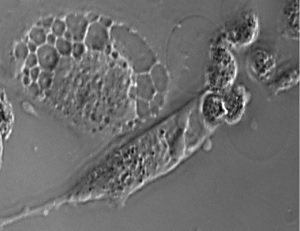 |
| Cancer cells develop holes and waste away after treatment with the antibody drug conjugate targeting SAS1B on their surface.--Courtesy of UVA |
By noticing a connection between developing human egg cells and tumor cells, researchers at the University of Virginia have developed a method of cancer drug delivery that could more selectively target the offending cells and keep healthy tissue safe from harm, possibly preserving fertility, as well.
The team of scientists originally focused their efforts on developing an improved female contraceptive that would target growing eggs, which would potentially become an alternative to steroidal or hormonal contraceptives. But on their way, the researchers happened upon a discovery that the protein they were using--SAS1B, which is usually only on the surface of egg cells--also showed up at first on uterine cancer cells, and then on other cells associated with breast, melanoma, renal, ovarian, head and neck and pancreatic cancers.
Because SAS1B is virtually nonexistent in other parts of the body, these new locations could offer a new target for cancer drugs with the addition of monoclonal antibodies, which attach to any cell with the SAS1B proteins, carrying the drugs there and injecting them into the tumor. Importantly, this targeting could reduce side effects of the drug because they are so specifically targeted, reducing hair loss, nausea, anemia and neuropathy in both men and women. And for women, the drug could help conserve eggs so that fertility remains unaffected, a common side effect of the potent cancer drugs.
What's more, SAS1B could also be used as a diagnostic tool; raised levels of the protein in a patient's blood could indicate the early stages of cancer.
"We think we have a way not only to more specifically target cancer cells, but a way that could become a frontline treatment for women who have cancers of many types and want to preserve fertility," co-author John Herr, who worked with partner Eusebio Pires, said in a statement. "... The research opens a new field of inquiry, termed cancer-oocyte neoantigens, and reveals a previously little known fundamental aspect of cancer--that many types of cancer, when they disregulate or go awry, revert back and take on features of the egg, the original cell from which all the tissues in the body derive."
- here's the release